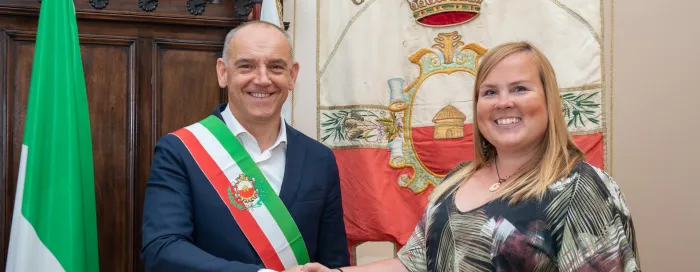This article by Luca Menesini, mayor of Capannori (Italy), has originally been published in the Progressive Post magazine of the Foundation for European Progressive Studies (FEPS).
Reducing undifferentiated waste upstream: this is the real challenge of our ‘Zero Waste’ philosophy and strategy, and this is what we have managed to do in the Tuscan municipality of Capannori thanks to the great involvement of citizens.
If, in the early 2000s, separating waste well with separate waste collection was the gold standard for all administrations that wanted to protect the environment, today this gold standard is to produce as little undifferentiated waste upstream as possible, exactly as the European guidelines indicate. This, translated into concrete actions, means more reuse and more recycling, and becomes an achievable goal by adding to the separate waste collection the creation of true circular economy districts, which involve people and the things they do in their daily lives.
Therefore, in Capannori, we have upgraded spring water sources and installed fountains for free public water and incentives for the use of glass bottles. Significant organisations have sprung up, such as the Daccapo re-use centre, the Terra di Tutti social enterprise, and the Lillero association, which have placed re-at the heart of their activity and to which we as a municipality give support.

How do we achieve this great and beautiful civic participation? By holding many public assemblies, to share the idea and the purpose of the innovation we want to put in place, and by listening to people’s suggestions, which are often tailored to specific needs and therefore indispensable for perfecting or improving a service or a sustainability project.
Alongside a deep-rootedness in the territory that explains the higher purpose of applying so many good practices in everyday life – to protect the environment and hand over a better cared-for planet to the next generations – it is important to implement a policy to incentivise good practices. In 2014, for this reason, we introduced punctual pricing: a waste tariff calculation mechanism that makes those who produce more undifferentiated waste pay more and rewards virtuous citizens. A rewarding mechanism, enhanced with further discounts in the bill for those who do home composting or worm-composting (also suitable for flat dwellers), for those who bring electrical and electronic appliances to recycling facilities, for those who take bulky waste to one of the local ‘ecological islands’, for those who follow a lifestyle in line with the zero waste strategy and have joined the ‘Zero Waste Families’ project.
In order to be able to go beyond our 90 per cent separate waste collection, it is essential to study which type of waste is dominant in the bags of undifferentiated waste and to make targeted interventions on that specific type of waste. This task, in Capannori, is carried out by the Zero Waste Research Centre based in the Segromigno in Monte science park, a hamlet of Capannori, and thanks to its analysis and processing, we can implement new actions.
For example, it has emerged that used nappies are responsible for a high percentage (45 per cent!) of the undifferentiated waste and this is why we have decided to host a platform for the recycling of absorbent materials on our territory, which will allow us to come close to 100 per cent separate waste collection. In order to build the plant, we participated in a call for tenders of the Italian National Recovery and Resilience Plan, obtaining a European co-financing of 10 million Euros. This is a very significant result, confirming that Capannori’s environmental policy follows the European guidelines and finds Europen support (with significant economic contributions) to improve the waste disposal cycle.
Thanks to my role in the Committee of the Regions in Brussels, I have been able to study in-depth and learn in detail the challenge facing all levels of government on the issue of textiles – and again by examining undifferentiated waste we have seen that textiles account for 15 per cent of the undifferentiated part – and therefore, having territorial entities that deal with the reuse of clothes. We felt it was significant for the environment to have a textile waste sorting centre to identify the different fibres and to lead them to separate primary treatment lines that will provide for initial sanitisation and subsequent packaging. Part of the material will go for recycling and another part will be put back into the reuse circuit, not least through the manual work of sorting and separating.
We also obtained European co-financing of 5.5 million Euro for the construction of this plant. In Capannori, therefore, we can say that today we are tackling the environmental and waste issue at 360 degrees, that is, from the point of view of the good practices that citizens can carry out, and from the point of view of the necessary infrastructures. It is precisely this mix and the ambition to always go beyond what has been achieved that has led us to obtain, in July 2022, the title of the first Italian city to be granted the European zero waste certificate.

***
© Photo credits: City of Capannori
The header image shows Capannori's mayor and PES Group member Luca Menesini with Kaisa Karjalainen, Coordinator of the Mission Zero Academy.
